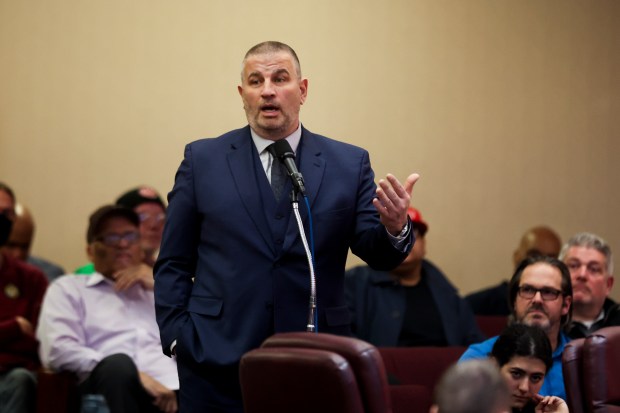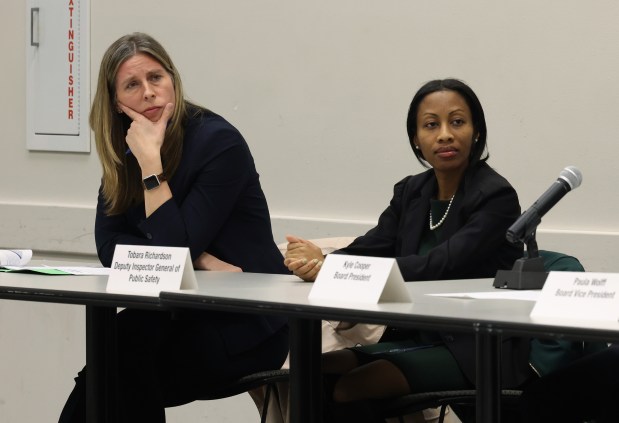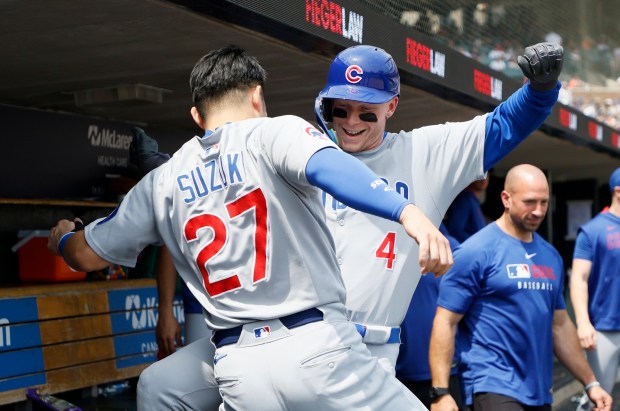A Cook County judge’s order kept the Chicago Police Board frozen for much of the first two months of 2024. The Civilian Office of Police Accountability, meanwhile, was busy.
COPA, the agency tasked with probing use-of-force incidents and other misconduct involving CPD officers, closed 143 investigations in January and February, according to records obtained by the Tribune via the Freedom of Information Act. Those investigations involved 302 Chicago cops accused of misconduct.
The findings and recommendations in each case were not yet known, but during February’s meeting of the Chicago Police Board, Superintendent Larry Snelling said COPA recommended 28 officers be fired from the Police Department in just the first two months of 2024.
For now, though, the professional fates of those accused officers — and the future of police discipline in Chicago overall — remain clouded ahead of an anticipated ruling from the judge later this month.
Most of the 302 accused are rank-and-file officers, though several supervisors and a handful of district-station detention aides also face allegations of misconduct. The majority of those now-concluded investigations stemmed from incidents that allegedly occurred between 2019 and 2022, records show.
And while the process is stalled, many of the officers in question remain on the city payroll, some on the street and others in roles at the police communications center or writing traffic tickets, according to CPD staffing data and Cook County court records.
The officers faced a wide range of accusations, including the sexual abuse of a minor in the south suburbs, excessive force and civil rights violations, improperly executed search warrants reminiscent of the high-profile wrongful raid at the home of Anjanette Young, submitting false reports, and a conspiracy by three officers to bring bogus criminal charges against a security guard who tried to remove an aggressive cop from a River North bar after last call.
The officer at the center of that incident was accused of misconduct in five additional COPA investigations in the window reviewed by the Tribune, records show. The analysis of COPA data found that 23 CPD officers were accused of misconduct in more than one case in that span.
Several police shooting investigations were also among the recently closed cases.
The latest dispute over police discipline stems from contract negotiations between the city and the FOP last summer. The arbitrator overseeing those talks, Edwin Benn, issued an award to the union that granted officers accused of serious misconduct a choice in how their cases would be adjudicated. As public sector employees represented by a collective bargaining unit, Benn said, CPD officers have the right to have misconduct cases decided by a third party outside of public view.
In December, Mayor Brandon Johnson opted to split the tentative contract proposal into two votes. The first — described as the “economic package” — was approved by the City Council without any questions posed to city negotiators. That package provides CPD officers with a 20% raise over four years, while also creating a new disciplinary mechanism to more quickly adjudicate minor misconduct cases.
The second package, which deals only with the most serious cases of misconduct, was voted down three times by aldermen, most recently in February. The FOP has since filed a lawsuit against the city, asking a judge to order the arbitration award into effect. A ruling from Judge Michael Mullen is expected later this month.
After receiving COPA’s findings and recommendations, the superintendent of police has 90 days to review the case materials and decide if he agrees. If he does, attorneys for the superintendent will bring administrative charges against an officer. The most serious charges, those asking for at least a yearlong suspension or an officer’s firing, have historically been adjudicated by the Chicago Police Board.

If the superintendent disagrees with COPA, a single randomly selected member of the Police Board decides if an officer will face charges and an evidentiary hearing. That process — a “request for review” — played out for the first time under Snelling’s tenure earlier this year when the CPD brought charges against an officer involved in a fatal shooting in 2019.
The deluge of closed misconduct investigations prompted Snelling to sharply criticize COPA during the February meeting of the Chicago Police Board. Snelling accused misconduct investigators of injecting opinions and personal biases that resulted in excessive penalties for CPD officers.
“What we’re seeing are egregious penalties for extremely minor infractions,” Snelling said. “Now, oftentimes when I go through these reports, I agree that the infraction should have been sustained, but a 30-day (or) 90-day suspension is egregious.”
Scott Spears, CPD’s chief legal counsel, said during February’s Police Board meeting that the 28 separation cases the Police Department received in the first two months of 2024 nearly matches 2023’s total of 32. Those 28 new case findings and recommendations — each of which requires approximately 40 hours to review — will be handled by just five sergeants assigned to CPD’s office of legal affairs and will require substantial overtime, Spears said.
COPA’s chief administrator, Andrea Kersten, said the City Council’s approval of most of the new FOP contract forced the agency to wrap up any investigation more than 18 months old. She also noted that COPA does not impose discipline for CPD officers, as those decisions rest with the CPD and Police Board.
“You’ll never again have a day in January where you receive a whole bunch of separation recommendations on our oldest, most difficult cases, but that was the situation that COPA was placed in by the nature of that collective bargaining agreement,” Kersten said last month. “There’s a very sensible timeline now set out in the FOP contract. That’s good, that’s important for accountability.”




